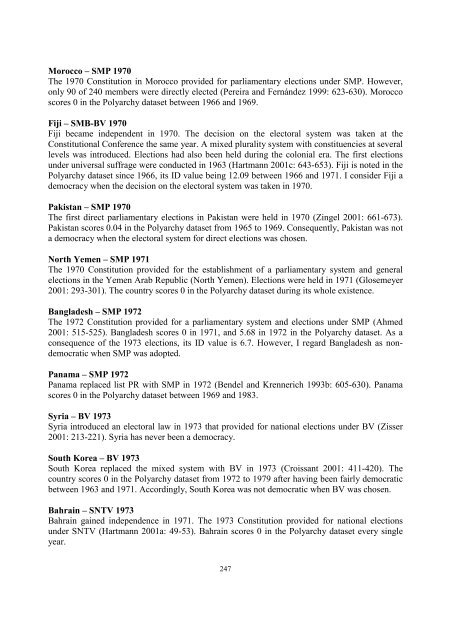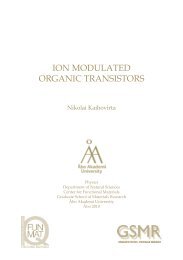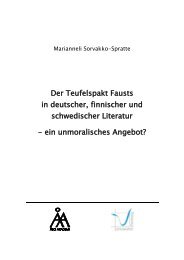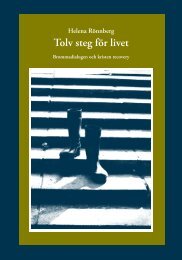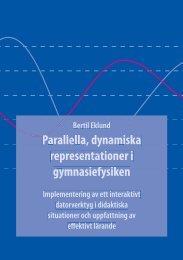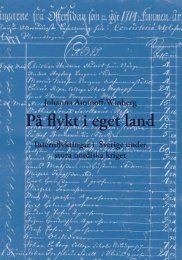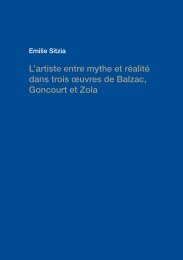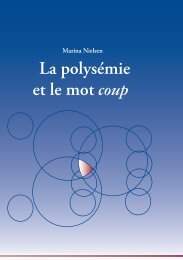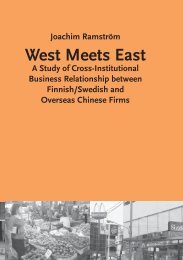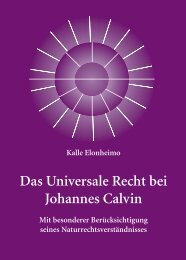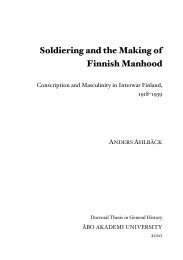- Page 1 and 2:
Krister LundellContextual Determina
- Page 3:
CONTEXTUAL DETERMINANTS OF ELECTORA
- Page 6 and 7:
CIP Cataloguing in PublicationLunde
- Page 8 and 9:
at Åbo Akademi University, the Fac
- Page 10 and 11:
3.2 Explanations of Electoral Syste
- Page 12 and 13:
9. CONCLUSION 2239.1 The Rational P
- Page 14 and 15:
politics. Both approaches bear rele
- Page 16 and 17:
electoral system choice as an epoch
- Page 18 and 19:
1.2 The Importance of Electoral Sys
- Page 20 and 21:
Within the range of democratic inst
- Page 22 and 23:
will depend on the specific cleavag
- Page 24 and 25:
Before describing different voting
- Page 26 and 27:
2.1.1 Ballot StructureThe ballot st
- Page 28 and 29:
formula, and the variety of elector
- Page 30 and 31:
ather be regarded as a characterist
- Page 32 and 33:
2.2.1 Plurality Systems2.2.1.1 Sing
- Page 34 and 35:
mixture of BV and PBV. In my classi
- Page 36 and 37:
Weaver 1984: 198-199). CV implies t
- Page 38 and 39:
total election, often pull out of t
- Page 40 and 41:
disadvantage is that it presupposes
- Page 42 and 43:
parties and minority groups. Furthe
- Page 44 and 45:
simultaneously avoiding disproporti
- Page 46 and 47:
and Blais. They also agree that the
- Page 48 and 49:
Whether one formula applies or not
- Page 50 and 51:
difficult. Even an independent comb
- Page 52 and 53:
attention to all three main dimensi
- Page 54 and 55:
(national, regional and local lists
- Page 56 and 57:
The degree of proportionality also
- Page 58 and 59:
variables: ethnic and cultural dive
- Page 61 and 62:
smallest category, representing 15
- Page 63 and 64:
democracies. 12 Nevertheless, the g
- Page 65 and 66:
(Vanuatu) are represented by merely
- Page 67 and 68:
3. THEORETICAL FRAMEWORKIn this cha
- Page 69 and 70:
ecognition of opposing views in the
- Page 71 and 72:
systems. If we reformulate the ques
- Page 73 and 74:
the rules, the lack of knowledge is
- Page 75 and 76:
not. Consequently, their analysis c
- Page 77 and 78:
proportional electoral systems. He
- Page 79 and 80:
groups as possible, to avoid attemp
- Page 81 and 82:
associated with certain features an
- Page 83 and 84:
also called electoral engineering.
- Page 85 and 86:
(2002: 14). Public opinion, often e
- Page 87 and 88:
Similar reform societies were estab
- Page 89 and 90:
systematically favor or disfavor ce
- Page 91 and 92:
interests based on ascriptive commu
- Page 93 and 94:
argues, both majorities and minorit
- Page 95 and 96:
A more popular form of recognizing
- Page 97 and 98:
Among the three basic majoritarian
- Page 99 and 100:
politics. When universal suffrage w
- Page 101 and 102:
and no electoral threshold in order
- Page 103 and 104:
threatened to change the current el
- Page 105 and 106:
inadequate since electoral systems
- Page 107 and 108:
electoral reform is likely to occur
- Page 109 and 110:
main advocates of proportional repr
- Page 111 and 112:
whereas majoritarian systems prevai
- Page 113 and 114:
The rational learning model sees po
- Page 115 and 116:
3.2.4.1 Colonial LegacyColonial leg
- Page 117 and 118:
Different colonial powers administe
- Page 119 and 120:
The Australian and American colonia
- Page 121 and 122:
epresented the “wave of the democ
- Page 123 and 124:
The second wave of democratization
- Page 125 and 126:
parliamentary elections, particular
- Page 127 and 128:
parliamentary or presidential gover
- Page 129 and 130:
measure of ethnic and cultural dive
- Page 131 and 132:
medium size. The other 40 per cent
- Page 133 and 134:
size and electoral systems, two str
- Page 135 and 136:
that have previously held general e
- Page 137 and 138:
The association between party syste
- Page 139 and 140:
democratization process. Neverthele
- Page 141 and 142:
The occurrence of list PR in former
- Page 143 and 144:
Third, an electoral system must exi
- Page 145 and 146:
Three matters are of interest in co
- Page 147 and 148:
according to Lijphart’s definitio
- Page 149 and 150:
3.3.3.2 Territorial OrganizationA n
- Page 151 and 152:
to the whole territory. Countries a
- Page 153 and 154:
or non-existence of an ‘additiona
- Page 155 and 156:
subset of the world’s countries,
- Page 157 and 158:
Concerning data on party system fra
- Page 159 and 160:
22). 30 Nevertheless, the coded yea
- Page 161 and 162:
(1) free and fair elections of the
- Page 163 and 164:
(e.g. 1984; 1990). The index is bas
- Page 165 and 166:
standards and Mauritius was democra
- Page 167 and 168:
Table 5.1. Ethnic and cultural frag
- Page 169 and 170:
Table 5.4. Ethnic and cultural frag
- Page 171 and 172:
values. Each integer of the logarit
- Page 173 and 174:
is also quite large, and therefore
- Page 175 and 176:
1966, and Cyprus 1981. Suriname ado
- Page 177 and 178:
significant. 36 The large standard
- Page 179 and 180:
small standard deviation values ind
- Page 181 and 182:
samples with changes to mixed syste
- Page 183 and 184:
a consequence of the party system t
- Page 185 and 186:
eplace plurality systems with mixed
- Page 187 and 188:
former British colonies did not inh
- Page 189 and 190:
Table 6.2. Colonial legacy and elec
- Page 191 and 192:
impact on the dependent variable wh
- Page 193 and 194:
(1993). All these countries adopted
- Page 195 and 196:
On the basis of figure 2.1 in secti
- Page 197 and 198:
their electoral systems. Bulgaria a
- Page 199 and 200:
as a general determinant of institu
- Page 201 and 202:
The average population size among c
- Page 203 and 204:
Only two federal states chose elect
- Page 205 and 206:
any major role. Regional diffusion,
- Page 207 and 208: Plurality systems dominate the thir
- Page 209 and 210: inherit the plurality system but al
- Page 211 and 212: popular system between 1945 and 199
- Page 213 and 214: presidential countries. Only Lebano
- Page 215 and 216: legislative bodies are distinguishe
- Page 217 and 218: legislative relations should also t
- Page 219 and 220: etween independent and dependent va
- Page 221 and 222: least 90 cases. Notwithstanding, as
- Page 223 and 224: Table 8.1. Patterns of diffusion an
- Page 225 and 226: other systems returns little to exp
- Page 227 and 228: extent but the coefficient is small
- Page 229 and 230: territorial organization and chambe
- Page 231 and 232: there are only two (Gabon and Vanua
- Page 233 and 234: the rational perspective, since it
- Page 235 and 236: 9. CONCLUSIONThis study is a contri
- Page 237 and 238: shows that countries having adopted
- Page 239 and 240: doubt that electoral systems affect
- Page 241 and 242: The third variable within the cultu
- Page 243 and 244: 9.4 Final RemarksThe impact of the
- Page 245 and 246: APPENDIX IClassification of countri
- Page 247 and 248: Sri Lanka - SMP 1948The Constitutio
- Page 249 and 250: Laos - SMP-BV 1953Laos achieved ful
- Page 251 and 252: Greece - List PR 1958After having a
- Page 253 and 254: Madagascar - Super-mixed 1960The 19
- Page 255 and 256: Iran - SMP-BV 1963In 1963, Iran ado
- Page 257: Polyarchy dataset between 1960 and
- Page 261 and 262: APPENDIX IICountry (year of elector
- Page 263 and 264: Country Democracy Electoral system
- Page 265 and 266: Country Democracy Electoral system
- Page 267 and 268: APPENDIX IIICountry (year of electo
- Page 269 and 270: Country Colonial Regional Form of T
- Page 271 and 272: Country Colonial Regional Form of T
- Page 273 and 274: APPENDIX IVParty system fragmentati
- Page 275 and 276: Proportional systems - change from
- Page 277 and 278: REFERENCESAhmed, Nizam. 2001. “Ba
- Page 279 and 280: Blais, André and R. K. Carty. 1987
- Page 281 and 282: Duverger, Maurice. 1984. “Which I
- Page 283 and 284: Hartmann, Christof. 1999b. “Cote
- Page 285 and 286: Koch, Christian. 2001. “Kuwait”
- Page 287 and 288: Lijphart, Arend. 2002. “The Wave
- Page 289 and 290: Norris, Pippa. 1995. “Introductio
- Page 291 and 292: Riker, William H. 1982. “The Two-
- Page 293 and 294: Taagepera, Rein and Matthew S. Shug
- Page 295: Why have countries in different par


